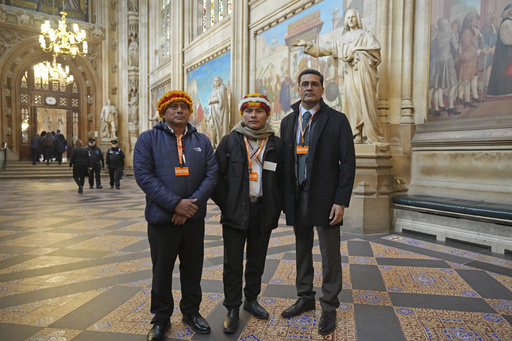
Indigenous leaders from the Wampis Nation of Peru have made a significant appeal to lawmakers at the House of Commons in London, urging them to prohibit international banks from financing oil activities in the Amazon, which they argue are detrimental to their ancestral rainforests.
Several major banks, including the UK’s HSBC, the U.S.-based JPMorgan Chase, and Spain’s Santander, have provided financial support to the state-owned oil firm Petroperu as it seeks to enhance a coastal refinery. This refinery processes oil extracted via a 680-mile (1,094-kilometer) pipeline that traverses the rainforest.
Recent reports indicate that this pipeline has experienced numerous leaks over the last decade. “For over 7,000 years, we have been safeguarding our forest,” stated Wampis leader Pamuk Teófilo Kukush Pati during a meeting on Thursday. The delegation plans to continue their advocacy efforts throughout the following day.
The pollution in their fishing waters has drastically impacted their livelihoods, leading Pati to express that “there is no guarantee of life… we are in a dire situation.” Another Wampis leader, Tsanim Evaristo Wajai Asamat, highlighted the troubling reality that various banks fund Petroperu, amplifying concerns about similar activities occurring throughout the Amazon basin.
In 2021, these banks were pivotal as “bookrunners” for a $1 billion bond offering aimed at funding refinery renovations. This role involves promoting the bonds to potential investors and leveraging their credibility to cultivate investor confidence. Financial estimates from Dealogic suggest that each bank earned approximately $583,000 in fees from this venture.
In response to these claims, a spokeswoman for Santander stated that the bank strictly adheres to all applicable environmental regulations and conducts thorough evaluations before supporting Amazonian operations. Similarly, representatives from both JPMorgan and HSBC emphasized their commitment to Indigenous rights and indicated that they impose restrictions on funding projects in the Amazon.
Petroperu, in communication with stakeholders, acknowledged that there have been 89 leaks from the pipeline over the past decade, attributing only two of these incidents to equipment failure, while attributing the remainder to criminal actions or natural causes. The oil company reported that it has invested upwards of $180 million to remediate oil spill damages throughout this period.
The Wampis community comprises over 15,000 individuals residing in a territory of approximately 5,000 square miles (13,000 square kilometers), rich in biodiversity, home to countless fish and rare bird species. They gained international attention in 2015 when they established an autonomous government to protect their environment, a status that the Peruvian government does not recognize.
Petroperu’s bond prospectus for the refinery project warned potential investors about financial risks linked to oil leaks impacting local and Indigenous populations. This includes the possibility of protests, regulatory fines, compensation claims, and reputational damage. The prospectus acknowledged existing investigations by Peruvian authorities into oil spills involving former Petroperu executives, although the company contended it is only lower-level employees currently under scrutiny and stated its cooperation with investigators.
Following the bond arrangement, in 2022, authorities in Peru imposed 66 fines on Petroperu, including sanctions related to new spills from the pipeline. Despite these issues, the three banks continued their relationship with Petroperu in the following year, assisting the oil company in negotiating the terms of its debt.
The Wampis community is also raising concerns over illegal logging and mining activities within their territory. Alongside other delegations, they are advocating for legislation aimed at criminalizing environmental damage and human rights violations by British businesses.
Delegates from countries including Colombia, Liberia, and Mexico engaged in discussions with a baroness and officials from the U.K. Foreign Office and Environment Department regarding these pressing issues. Jesús Javier Thomas González, representing northern Mexico, described a decade-long conflict with a mining corporation listed on the London Stock Exchange, which he claims has unlawfully occupied and devastated their land.
He pointed out that while the company maintains a positive reputation in the UK, its operations in Mexico reflect a different reality characterized by significant economic and political influence.
A representative from the U.K. government emphasized the expectation that British corporations should proactively prevent environmental harm, noting that the government continually evaluates its strategies to address those who fail to meet these responsibilities.
